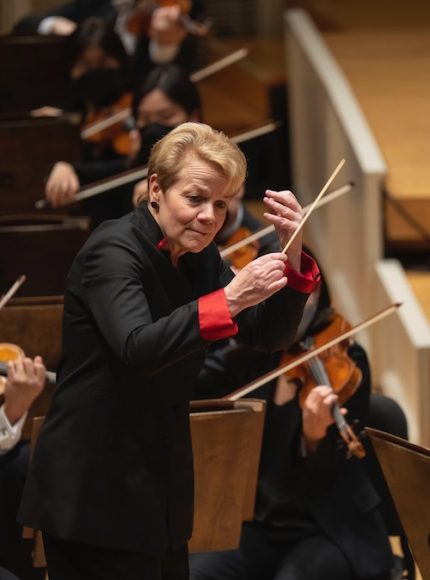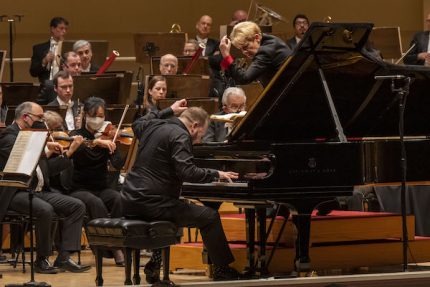With a new Ravinia contract in pocket, Alsop pumps up the volume with CSO

Let the games begin.
No, not the Olympics. For classical audiences in Chicago, the most compelling extended competition over the next year will be the one launched Thursday night at Orchestra Hall with Marin Alsop conducting the Chicago Symphony Orchestra. The concert unofficially kicked off the search for a podium successor to Riccardo Muti, whose 2022-23 season will end his tenure next June.
As reported last week on CCR, there has been a strong backstage push for Alsop as music director by CSOA board members—this despite a significant lack of enthusiasm by CSO musicians, audience members and local musical press.
In an artfully timed show of support, the Ravinia Festival announced hours before Thursday’s concert that the festival had renewed Alsop’s’s contract through 2025 as chief conductor of the Highland Park series, which is the summer home of the CSO.
The evening’s program of Romantic showpieces played to the 65-year-old conductor’s strengths. Yet even so, admirable moments of worthy music-making mingled with unkempt tuttis, static transitions and overloud climaxes. Despite the adulatory applause by her fans in the audience, the concert served to bolster the view that Alsop is not a credible choice to follow Muti on the Orchestra Hall podium.
The program led off with Samuel Barber’s Symphony No. 1. Written at age 26 and premiered in 1937, this compact, closely wrought, single-movement work is among the American composer’s finest inspirations, a characteristic blend of tough defiance and richly nostalgic lyricism.
It’s hard to fathom that this seminal American symphony hasn’t been performed by the CSO in 25 years. Kudos to Alsop for resurrecting this youthful Barber masterwork.
The conductor knows her way around this score and Alsop’s recording of the First Symphony was the prize of her rather uneven recorded series of Barber’s complete orchestral works (Naxos).
Thursday’s CSO performance proved more variable. Conducting without a score Alsop led a powerful opening of the dramatic first section. Yet tension and momentum ebbed at the transition into the oboe-led second theme, the music losing focus and turning episodic. The central scherzo-like section went well, the gamboling strings and winds providing playful contrast. As always, Barber saves his best tunes for the oboe and William Welter lifted a resplendent rendering of the long-limbed solo that launches the final section. Yet here Alsop overplayed her hand, peaking too early with the volume and boosting the climaxes to a wincing degree, brass swamping the strings.
The concert closed with a much better-known orchestral showpiece, Sir Edward Elgar’s Enigma Variations. The English composer found international fame late in life in his early 40s, when he composed Enigma in 1899. Nearly 125 years later, Elgar’s ingenious essay remains one of a kind, a set of variations depicting himself, his wife and a host of delightfully quirky friends. The genius in the music is the theme’s fecund opportunities and Elgar’s deftly judged contrasts in the sections and brilliant scoring (Elgar was entirely self-taught). Yet, as Alsop noted in her cordial if unnecessary introduction to the work, it is the deep well of affection that characterizes this warm-hearted homage to friendship.
For most of Thursday’s performance this was a superb Enigma—well blended, ideal tempos and portraits vividly characterized. Among the highlights were an “Ysobel” of charming delicacy, a brusque and wonderfully bombastic “Troyte” and the “Romanza” exploring an atmosphere of romantic mystery. Nimrod began in an apt hush and grew fluently to a resonant lyrical climax, albeit without quite touching the heart as it should.
Unfortunately, the performance concluded with a rendition of Elgar’s own variation that showed Alsop at her worst. The conductor’s tendency to push climaxes to levels beyond what the music calls for was here in abundance, the volume deafening and brass and percussion again overwhelming the rest of the orchestra in a raucous, raw-toned sonic onslaught. Instead of a refined gentleman of confidence and determination, in Alsop’s hands, Elgar’s self-portrait morphed the composer into an uncouth and obnoxious loudmouth.
The evening’s centerpiece provided prime box-office bait with Rachmaninoff’s Piano Concerto No. 2 played by Lukáš Vondráček. The Czech pianist performed the same concerto with Jakub Hrůša and the Boston Symphony Orchestra last week.

Vondráček turned in an individual, somewhat off-center “Emperor” concerto last summer with Alsop at Ravinia. On that occasion, the soloist’s freshness and spontaneity brought new life to Beethoven’s warhorse, winning out over the pianist’s fitful oddities.
Thursday night’s performance was closer to a draw with Vondráček’s indulgence too often crossing the line into self-defeating weirdness. In the opening of the first movement he bizarrely inserted notes in between the widely spaced chords. His staccato style, pecking at notes, distracted from the longer arc, as did his occasional theatrical gestures and reactions to orchestral tuttis. With his habit of over-emphasizing secondary accompanimental figures, the performance felt micromanaged soloistically and heavy-footed generally. With Alsop as co-conspirator, the ultra-emphatic thud of the movement’s final chord was simply vulgar.
The ensuing movements were somewhat less self-regarding and more successful. Vondráček distilled a poised, rapt expression in the Adagio with John Bruce Yeh’s burbling clarinet on the same elevated level.
Rachmaninoff’s soaring melodies and barn-burning virtuosity make the finale nearly foolproof. Yet while Vondráček’s blistering speed and accuracy provided undeniable excitement at times, the herky-jerky performance diluted the sense of a cumulative payoff at the coda.
Alsop’s accompaniment was less ostentatious than her soloist but there was characteristic unkemptness along with moments of miscoordination between pianist and orchestra.
The extended ovations brought Vondráček back out for a limpid encore of Schumann’s “Träumerei.”
The program will be repeated 8 p.m. Saturday. cso.org
Posted in Performances



Posted Feb 12, 2022 at 2:04 am by Erem E Bobrakov
Bravo, Mr. Johnson!
My assessment exactly. As I recall, the great Russian pianist Sviatoslav Richter–famously considered a proponent of faithful execution of a composer’s design–said “When music lovers come to listen to a piece of Bach, they expect Bach–not an opus by Glenn Gould.” No matter how talented Glenn Gould was.
Ms. Alsop frequently presides over what can be described as an incoherent noise.
Posted Feb 13, 2022 at 2:56 am by Alexander Platt
Kudos indeed to Marin Alsop for conducting a taut, sweeping, dramatic performance of Samuel Barber’s First Symphony. The idea that CSO audiences had to wait 25 years to hear this true American classic is in itself a scandal.
Posted Feb 14, 2022 at 10:25 am by Roger Thomson
Listening to the SLOW-moving train wreck of Rachmaninov’s Second Piano Concerto Thursday night, I tended to blame the disaster on Lukas Vondracek’s overblown, excitement-killing rubato and his idiosyncratic dynamics and voicing. My impression was that Alsop tried to respect his artistic style while bringing him along as best she could.
Posted Feb 14, 2022 at 11:47 am by Nancy
We couldn’t agree more with your courageous review of the CSO February 10 performance. The Rachmaninoff treasure was almost unrecognizable. That and the normally moving Nimrod evoked no usually felt emotion. Thank you for your candor.
Posted Feb 14, 2022 at 4:22 pm by NANCY BERMAN
Alsop is hardly a replacement for Muti, Barenboim or Solti.